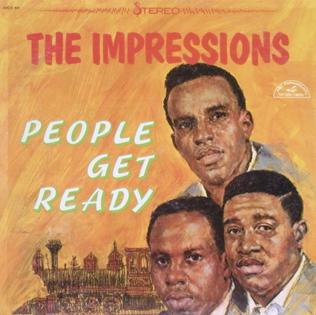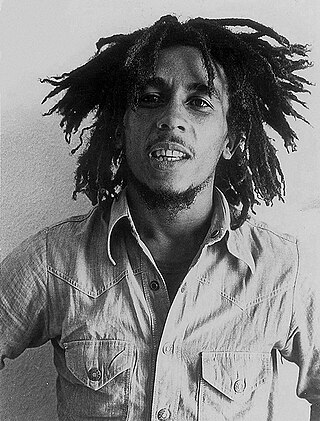Related Research Articles

Reggae is a music genre that originated in Jamaica during the late 1960s. The term also denotes the modern popular music of Jamaica and its diaspora. A 1968 single by Toots and the Maytals, "Do the Reggay", was the first popular song to use the word reggae, effectively naming the genre and introducing it to a global audience. Reggae is rooted out from traditional Jamaican Kumina, Pukkumina, Revival Zion, Nyabinghi, and burru drumming. Jamaican reggae music evolved out of the earlier genres mento, ska and rocksteady. Reggae usually relates news, social gossip, and political commentary. It is instantly recognizable from the counterpoint between the bass and drum downbeat and the offbeat rhythm section. The immediate origins of reggae were in ska and rocksteady; from the latter, reggae took over the use of the bass as a percussion instrument.
Burnin' is the sixth album by Jamaican reggae group the Wailers, released in October 1973. It was written by all three members and recorded and produced by the Wailers in Jamaica, contemporaneously with tracks from the Catch a Fire album with further recording, mixing and completion while on the Catch a Fire tour in London. It contains the song "I Shot the Sheriff". It was the last album before Marley, Peter Tosh and Bunny Wailer decided to pursue solo careers, while continuing their local releases through their company Tuff Gong Records. A commercial and critical success in the United States, Burnin' was certified Gold and later added to the National Recording Registry, with the Library of Congress deeming it historically and culturally significant.

Catch a Fire is the fifth studio album by the reggae band The Wailers, released in April 1973. It was their first album released by Island Records. After finishing a UK tour with Johnny Nash, they had started laying down tracks for JAD Records when a disputed CBS contract with Danny Sims created tensions. The band did not have enough money to return to Jamaica, so their road manager Brent Clarke approached producer Chris Blackwell, who agreed to advance The Wailers money for an album. They instead used this money to pay their fares back home, where they completed the recordings that constitute Catch a Fire. The album has nine songs, two of which were written and composed by Peter Tosh; the remaining seven were by Bob Marley. While Bunny Wailer is not credited as a writer, the group's writing style was a collective process. For the immediate follow-up album, Burnin', also released in 1973, he contributed four songs. After Marley returned with the tapes to London, Blackwell reworked the tracks at Island Studios, with contributions by Muscle Shoals session musician Wayne Perkins, who played guitar on three overdubbed tracks. The album had a limited original release under the name The Wailers in a sleeve depicting a Zippo lighter, designed by graphic artists Rod Dyer and Bob Weiner; subsequent releases had an alternative cover designed by John Bonis, featuring an Esther Anderson portrait of Marley smoking a "spliff", and crediting the band as Bob Marley and the Wailers.

Kaya is the tenth studio album by the Jamaican band Bob Marley and the Wailers, released in 1978. The album consists of tracks recorded alongside those released on the Exodus album. It was produced by the band.

Bob Marley and the Wailers were a Jamaican ska, rocksteady and reggae band. The founding members, in 1963, were Bob Marley, Peter Tosh, and Bunny Wailer.
Joseph Benjamin Higgs was a reggae musician from Jamaica. In the late 1950s and 1960s he was part of the duo Higgs and Wilson together with Roy Wilson. He was a popular artist in Jamaica for four decades and is also known for his work tutoring younger musicians including Bob Marley and the Wailers and Jimmy Cliff.

Christopher Percy Gordon Blackwell OJ is a Jamaican-British former record producer and the founder of Island Records, which has been called "one of Britain's great independent labels." According to the Rock and Roll Hall of Fame, to which Blackwell was inducted in 2001, he is "the single person most responsible for turning the world on to reggae music." Variety describes him as "indisputably one of the greatest record executives in history," while Barron's has described him as "a contender for most interesting man in the world."

Donovan Letts is a British film director, disc jockey (DJ) and musician. Letts first came to prominence as the videographer for the Clash, directing several of their music videos. In 1984, Letts co-founded the band Big Audio Dynamite with former Clash lead guitarist and co-lead vocalist Mick Jones, acting as the band's sampler and videographer before departing the band in 1990.
Reggae Sunsplash was a reggae music festival held annually in Jamaica from 1978 to 1996, with additional events in 1998 and 2006. The festival expanded to include international tours in 1985 and was revived as a virtual event in 2020 by Tryone Wilson, Debbie Bissoon and Randy.

Wrong Side of the Road is a 1981 low-budget feature film made in South Australia. It is distinctive for being one of the first attempts to bring modern Australian Aboriginal music to a non-Indigenous audience, featuring all-Aboriginal rock reggae bands No Fixed Address and Us Mob.
"Police and Thieves" is a reggae song first recorded by the falsetto singer Junior Murvin in 1976. It was covered by the punk band The Clash and included on their self-titled debut album released in 1977.

"People Get Ready" is a 1965 single by the Impressions, and the title track from the People Get Ready album. The single is the group's best-known hit, reaching number three on the Billboard R&B chart and number 14 on the Billboard Hot 100. The gospel-influenced track was a Curtis Mayfield composition that displayed the growing sense of social and political awareness in his writing.
The Smile Jamaica Concert was a reggae concert held on 5 December 1976 at the National Heroes Park in Kingston, Jamaica, aimed at countering political violence. Bob Marley had agreed to perform, but, two days before the concert, he was shot in his home. He recovered and, with The Wailers, played a 90-minute set for the 80,000 people in attendance.
No Fixed Address (NFA) are an Australian reggae rock group whose members are all Aboriginal Australians, mostly from South Australia. The band formed in 1979, split in 1984, with several brief reformations or guest appearances in 1987–1988 and 2008, before reuniting in 2016 and continuing to perform into 2024. The original members were Bart Willoughby, Les Graham, Ricky Harrison, John Miller, and Veronica Rankine. As of 2024 the members are Willoughby, Harrison, Tjimba Possum Burns, and Sean Moffat. They were the first Aboriginal band to travel overseas. They have been inducted into the Hall of Fame at the inaugural National Indigenous Music Awards as well as the SA Music Hall of Fame, and have had a laneway in Adelaide CBD named after them.

Robert Nesta Marley was a Jamaican singer, songwriter, and guitarist. Considered one of the pioneers of reggae, he fused elements of reggae, ska and rocksteady and was renowned for his distinctive vocal and songwriting style. Marley increased the visibility of Jamaican music worldwide and made him a global figure in popular culture. He became known as a Rastafarian icon, and he infused his music with a sense of spirituality. Marley is also considered a global symbol of Jamaican music and culture and identity and was controversial in his outspoken support for democratic social reforms. Marley also supported the legalisation of cannabis and advocated for Pan-Africanism.
Messenjah is a Canadian-based reggae group that flourished to become one of the most successful and popular reggae groups in the history of Canadian music.
John Masouri is a journalist, author, reviewer and historian for Jamaican music and several of its musical offshoots including dub, roots and dancehall. He is one of the world's foremost reggae music journalist and has worked extensively over it.
Wirrinyga Band are a rock band from Milingimbi, a small island in Arnhem Land, Northern Territory. The band members are Yolngu. They sing in both Language and English and they mix modern instruments with traditional.
Mixed Relations were an Australian band formed by Bart Willoughby. They played a mixture of reggae rock, pop, and jazz. Mixed Relations toured Aboriginal communities, Australian cities, Pacific Islands, New Zealand, United States, Europe, Canada ,and Hong Kong. Their track, "Aboriginal Woman", was listed at No. 89 on the Triple J Hottest 100, 1993.

Marley is a 2012 documentary-biographical film directed by Kevin Macdonald documenting the life of Bob Marley.
References
- ↑ The Age 13 Nov 2008 A Legend of the land
- ↑ Clough, Brent (2003). "Jamming Down-Under: Bob Marley's Legacy and Reggae Culture in Australia and New Zealand". In Eleanor Wint, Carolyn Cooper (ed.). Bob Marley: The Man and His Music : a Selection of Papers Presented at the Conference Marley's Music, Reggae, Rastafari, and Jamaican Culture, Held at the University of the West Indies, Mona Campus, 5-6 February 1995. Arawak publications. p. 30. ISBN 9789769504790.
"We Have Survived" has become an unofficial anthem of black pride and resilience.
- ↑ Dunbar-Hall, Peter; Chris Gibson (2004). Deadly Sounds, Deadly Places. Contemporary Aboriginal Musc in Australia. University of New South Wales Press. ISBN 9780868406220.
- ↑ Lawe Davies, Chris (1993). "Aboriginal rock music: space and place". In Tony Bennett (ed.). Rock and Popular Music: Politics, Policies, Institutions. Routledge. ISBN 9780415063692.
- ↑ National Film and Sound Archive Sounds of Australia registry